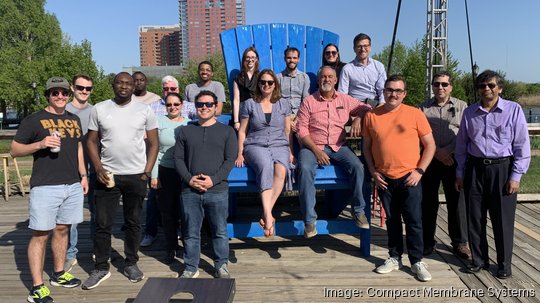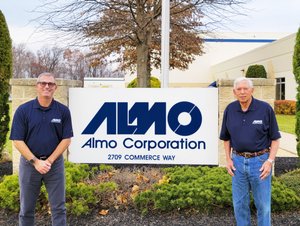
After considering a move to Houston, Compact Membrane Systems decided to double down on Delaware.
The company has invested some $3.1 million to build out a new headquarters in New Castle with 15,000 square feet of space, about 50% more than it currently occupies in Wilmington, and plans to triple its headcount within two years.
Compact Membrane Systems CEO Erica Nemser said the climate technology manufacturer is in the early stages of relocating and expects the process to be complete by April. The new headquarters at 15 Reads Way has existing lab space that is being modified and outfitted for Compact Membrane Solutions' research, development and manufacturing needs.
The company, which Nemser's father Stuart Nemser founded in 1993 following his time as a scientist at DuPont, is ramping up growth about six months after pulling in a $16.5 million funding round in August.
The company's technology uses membranes to capture and separate carbon dioxide rather than letting it release into the atmosphere. Its technology is a bolt-on option aimed at reducing emissions from hard-to-abate industries like steel and cement manufacturing. Compact Membrane Systems is shipping out three of their carbon capture devices to Europe this quarter for pilots at a steel plant, a kiln operator and a chemical plant, Nemser said.
The company explored relocating to the Houston area, the "Energy Capital of the World," where a lot of its customers and partners are located, Nemser said. Compact Membrane Systems needs to have representatives near those customers and has already added two people in Houston, but did not want to uproot its research and development teams from their base in Delaware.The region's strong talent base, the company's local roots, and the state's support of the company's mission all played into its decision to stay in Delaware.
"They're heavily committed and focused on enabling technology-driven companies to be successful," Nemser said of state officials. "One of the things that hard-tech companies need is lab space and I think [the state] is deeply sensitive to that and are really leaning into and supporting companies in a way that matters. We can't do the five-people-in-a-basement-type company"
Compact Membrane Systems received state grants of $760,480 for lab space and $115,000 to support jobs, both from the Delaware Prosperity Partnership, for its relocation to New Castle. Gov. John Carney said in a statement that the company's decision to stay "will help make our environment more sustainable and add jobs to our state." The state's role in keeping Compact Membrane Systems in Delaware is evidence of the emphasis it is putting on growing the clean energy sector.
"We're trying to make the proof point for the region," said Nemser, a University of Pennsylvania alum who is in her ninth year as CEO. "If I put it in a regional context, Delaware has always been [a leader in] materials innovation. Where the puck is going now in materials innovation is new materials or new sources of clean energy. We're trying to be doing that for decarbonization and carbon capture. We think we are a great example of what that looks like and the kind of venture-scale business that you can build in the Delaware Valley with the talent, with the capabilities."
Compact Membrane Systems began adding employees following its Series A raise last summer, upping headcount from about 20 to 30 in recent months with the bulk of them coming from Philadelphia-area universities, according to Nemser. The company plans to grow its staff to 60 by 2026 with most of those new hires based in Delaware.
The company's current growth, coming three decades after its launch, follows what Nemser called "a really successful period of research and development that gave it a deep bench of technology." She said decarbonization has now become prevalent in venture markets as startups look to target a potential trillion dollar industry.
"The reason we're growing now is to address that [opportunity]. We're not going to be able to do that as a small-scale business, we're going to be a venture-scale enterprise," said Nemser.







